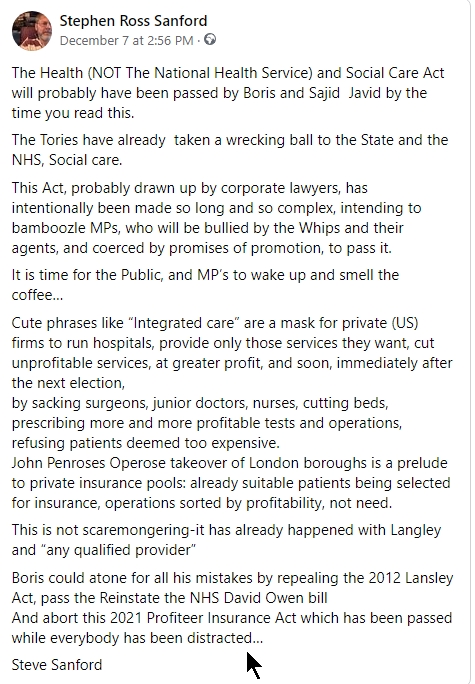





Every day across the UK, millions of older and disabled people are denied the social care they need and have a right to,” say Access Social Care, a charity providing free legal advice to help people get the care they are entitled to.
Social care ensures that vulnerable people are fed and washed, prevents loneliness, and safeguards basic human dignity. But Access Social Care point out that “75% of local authority leaders have said they are so underfunded, they are not confident they will meet their legal duties to provide social care.”
With social care in crisis and the COVID-19 pandemic ongoing, Access Social Care’s work is crucial. The charity are now raising funds to open three more legal hubs, serving over 4,000 people in need.
1. Allyson M Pollock, professor of public health1,
2. Luke Clements, Cerebra professor of law and social justice2,
3. Louisa Harding-Edgar, academic fellow in general practice3
Author affiliations
Neglect of social care during the pandemic shames the
UK
Covid-19 outbreaks in care homes expose serious inadequacies in social care
services across the UK. Data from across the world show that deaths from covid-19
mainly occur among older people, particularly those over 80.1 By 12 April
10 612 deaths had been reported in the UK2—40% of deaths have occurred
in those aged 60-79 and 52% in those 80 years or over.3
Close to 1.5 million vulnerable people are currently self-isolating indoors
for 12 weeks.4 These include many older people and people with disabilities
and chronic illnesses. Many are essentially in solitary confinement. Many residents
in care homes are trapped in their rooms, with no visits from relatives and
minimal interactions with staff. The decision to exclude relatives means that
care homes have become closed institutions, increasing the risk that people
are inappropriately denied hospital admission as well as the risk of neglect
and abuse.56 Of equal concern are plans to transfer patients recovering
from covid-19 from the NHS into empty nursing home beds.7
Privatised, fragmented
Social services in the UK are among the most privatised and fragmented in the
Western world. They have been underfunded for decades. Between 2010-11 and 2017-18
local authority spending on social care in England fell by 49% in real terms,8 while
privatisation increased.8 The UK has 5500 providers operating 11 300 care
homes for older people, and 83% of care home beds are provided by the for-profit
sector.9 Responsibility for funding has been shifted to individuals, and
there has been tightening of NHS and local authority eligibility criteria, as
well as long delays in assessing eligibility and inconsistent and inequitable
application of criteria.10
Care services in England employ roughly 1.6 million care staff (1.1 million
full time equivalent), of which 78% are employed by the independent sector.11 Pay
is low; 24% of people working in adult social care are on zero hour contracts,
and in March 2019 around a quarter were being paid the national living wage
of £7.83 an hour or less.12
Staff on zero hour contracts do not receive sick pay and often go to work when
sick. The sector is 120 000 workers short,13 and agency staff moving from
one home to another further increases the risk of covid-19 transmission. Social
care has been a low priority for personal protective equipment despite the high
risks for residents and staff.14
Irrational response
Emergency legislation in the UK has severely curtailed the legal rights to social
care services of elderly, ill, and disabled people in the community and in residential
settings.15 In place of the duty to meet all essential social care needs,
the coronavirus act substitutes a minimal obligation not to cut support below
the level required to maintain their most basic human rights.
The Disability Law Service, a charity providing free legal services to disabled
people, has condemned this action, stating that a rational response would have
been to “radically redress the care and support deficits of the past decade,
rather than take the action that is mandated by the 2020 Act.”16 The
service concluded that the action was contrary to international law—constituting
“regressive” social care legislation targeting those least able
to cope—and made no strategic sense.
Lack of access to essential social care (including for example, support after
hospital discharge and mental health services) as well as the impact from the
loss of routine NHS services will simply lead to more health crises, more hospital
admissions, and more essential workers, including NHS staff, having to take
time off work to care for family members.
The government has had to use emergency powers to overcome the fragmentation
of health services caused by the Health and Social Care Act 2012 in England.17 That
there are no equivalent emergency powers in social care legislation is a testimony
to the state’s abandonment of responsibility for this vital sector.
A substantial proportion of the NHS workforce is currently off work (14% in
Scotland18). The extra capacity available to health services through flexible
redeployment of staff is simply unavailable in the social care sector despite
government advice that “Care home providers are advised to work with local
authorities to establish plans for mutual aid, including sharing of the workforce
between providers, with local primary and community health services providers,
and with deployment of volunteers where that is safe to do so.”19
Integrate health and social care
The current emergency has exposed once again the need for a universal integrated
health and social care service: radical action is required to bring all services
and staff back under government control in a national and publicly accountable
system so that high quality care is delivered by a trained and properly equipped
workforce with decent terms and conditions of service.
A national health and social care system would (among many things) mandate the
collection of vital data quantifying the effect of covid-19 on the social care
sector—data on the number of cases and deaths by age, gender, ethnicity
(minority groups are overrepresented among deaths and cases), and care setting,
stratified by local authority area, ward, and general practice. An integrated
system would allow detailed monitoring of staffing levels, sickness levels,
the use of agency staff, and hospital admission rates for staff, residents,
and other vulnerable groups. Accurate, timely data are key to controlling this
pandemic.
What is needed—and what is so obviously lacking—is a plan of action.
A plan to temporarily relocate care home residents to safe, infection-free accommodation
allowing visitors; to provide covid-only facilities with extra staff support
for those who do not need hospital admission; to ensure adequate levels of trained
staff in all facilities, with adequate protective equipment; and to implement
comprehensive contact tracing and testing of suspected cases in staff and residents.
Above all we need a plan to transform our shameful social care system: a system
that fails those in need, fails carers (paid and unpaid), and shames the UK.